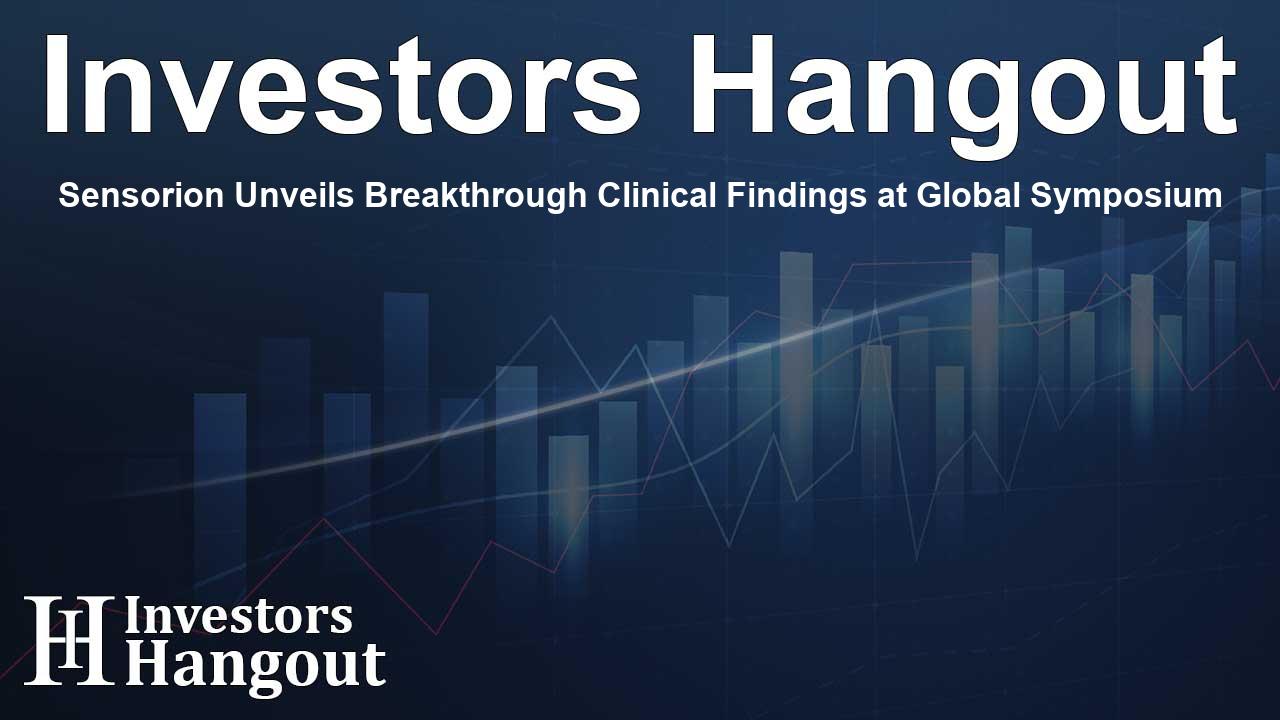Sensorion Unveils Breakthrough Clinical Findings at Global Symposium

Innovative Developments in Hearing Loss Treatments
Sensorion, a prominent clinical-stage biotechnology company, is making headlines with its groundbreaking therapies aimed at addressing hearing loss disorders. Renowned for its commitment to restoring lost hearing, Sensorion has recently revealed promising clinical data from its innovative gene therapy and small molecule programs. These findings were shared at the prestigious World Congress of Audiology (WCA) in Paris, where experts gathered to showcase significant medical advancements in the field.
Encouraging Results from Clinical Programs
At a detailed symposium, Sensorion highlighted its clinical programs, particularly SENS-501 and SENS-401, which focus on the complexities of hearing impairments. Professor Natalie Loundon, along with other distinguished colleagues, presented findings that demonstrate the potential of these therapies to tackle various conditions.
Diving into Gene Therapy: SENS-501
Drilling down into its gene therapy initiative SENS-501, Professor Catherine Birman reported positive safety results from initial patient trials. This gene therapy is designed to restore hearing for individuals affected by otoferlin deficiency, a leading cause of congenital deafness. Early observations from the first patient indicated that the treatment was well tolerated, showing signs of engagement and noticeable vocal changes in the child.
Understanding the Audiogene Study
The ongoing Audiogene study is focused on evaluating the safety, tolerability, and effectiveness of SENS-501 through intra-cochlear injections in pediatric patients aged 6 to 31 months. This important phase emphasizes early intervention, targeting a time when the auditory system’s adaptability is at its peak. By structuring the study with two dosage cohorts followed by an expansion cohort, Sensorion aims to ensure safety while also assessing the auditory brainstem response as the main measure of efficacy.
Progress in Small Molecule Therapy
SENS-401 signifies another major advancement in Sensorion's commitment to developing treatments for hearing challenges. This small molecule therapy is currently being examined in the NOTOXIS trial, which focuses on preventing hearing loss resulting from cisplatin ototoxicity, a notable issue for cancer patients undergoing chemotherapy. Initial findings reveal a promising safety profile, suggesting that higher doses of cisplatin tend to correlate with increased severity of ototoxic effects.
Details on the NOTOXIS Trial
The NOTOXIS Phase 2a trial aims to explore the potential of SENS-401 as a protective treatment against ototoxicity in adult patients. This multicenter study will evaluate a variety of endpoints, including the extent of hearing impairment and changes in pure tone audiometry, providing a thorough understanding of SENS-401's efficacy over a prolonged treatment duration.
Analysis of SENS-401 Results
During the symposium, more insights were shared regarding SENS-401’s capacity to preserve residual hearing following cochlear implantation. Research data from the Phase 2a trial produced clinically significant outcomes, showing that the small molecule can help maintain residual hearing when compared to a control group. The trial was meticulously designed to assess the presence of SENS-401 in the cochlea after a specified treatment protocol.
About Sensorion
Sensorion stands at the leading edge of biopharmaceutical innovation, driven by its mission to create effective therapies for the significant global demand for hearing loss treatment. Its distinctive R&D platform focuses on uncovering the underlying causes of inner ear disorders, making notable contributions to targeted therapeutic solutions.
The company is pushing forward with its gene therapy initiatives, specifically addressing hereditary forms of deafness, and has forged important partnerships to bolster its research efforts. SENS-501 and the GJB2-GT gene therapy hold immense potential for tackling hearing loss issues in both adults and children.
Alongside its advancements in gene therapy and small molecules, Sensorion continues to break new ground in otology. Building on successful trials, including those investigating SENS-401 across various contexts, Sensorion is committed to improving the lives of individuals affected by hearing disorders.
Frequently Asked Questions
What is Sensorion known for?
Sensorion is recognized for its innovative work in developing therapies aimed at restoring and treating hearing loss disorders.
What are SENS-501 and SENS-401?
SENS-501 is a gene therapy targeting otoferlin deficiency, whereas SENS-401 is a small molecule therapy designed to prevent hearing loss caused by cisplatin ototoxicity.
What findings were shared at the World Congress of Audiology?
The findings showcased positive initial results related to safety and effectiveness from clinical trials involving SENS-501 and SENS-401.
Where can I find more information about Sensorion?
You can find additional details on Sensorion's official website.
How does SENS-401 aim to protect hearing?
SENS-401 seeks to protect against ototoxicity from chemotherapy and aims to improve the preservation of residual hearing following cochlear implantation.
About The Author
Contact Logan Wright privately here. Or send an email with ATTN: Logan Wright as the subject to contact@investorshangout.com.
About Investors Hangout
Investors Hangout is a leading online stock forum for financial discussion and learning, offering a wide range of free tools and resources. It draws in traders of all levels, who exchange market knowledge, investigate trading tactics, and keep an eye on industry developments in real time. Featuring financial articles, stock message boards, quotes, charts, company profiles, and live news updates. Through cooperative learning and a wealth of informational resources, it helps users from novices creating their first portfolios to experts honing their techniques. Join Investors Hangout today: https://investorshangout.com/
The content of this article is based on factual, publicly available information and does not represent legal, financial, or investment advice. Investors Hangout does not offer financial advice, and the author is not a licensed financial advisor. Consult a qualified advisor before making any financial or investment decisions based on this article. This article should not be considered advice to purchase, sell, or hold any securities or other investments. If any of the material provided here is inaccurate, please contact us for corrections.
